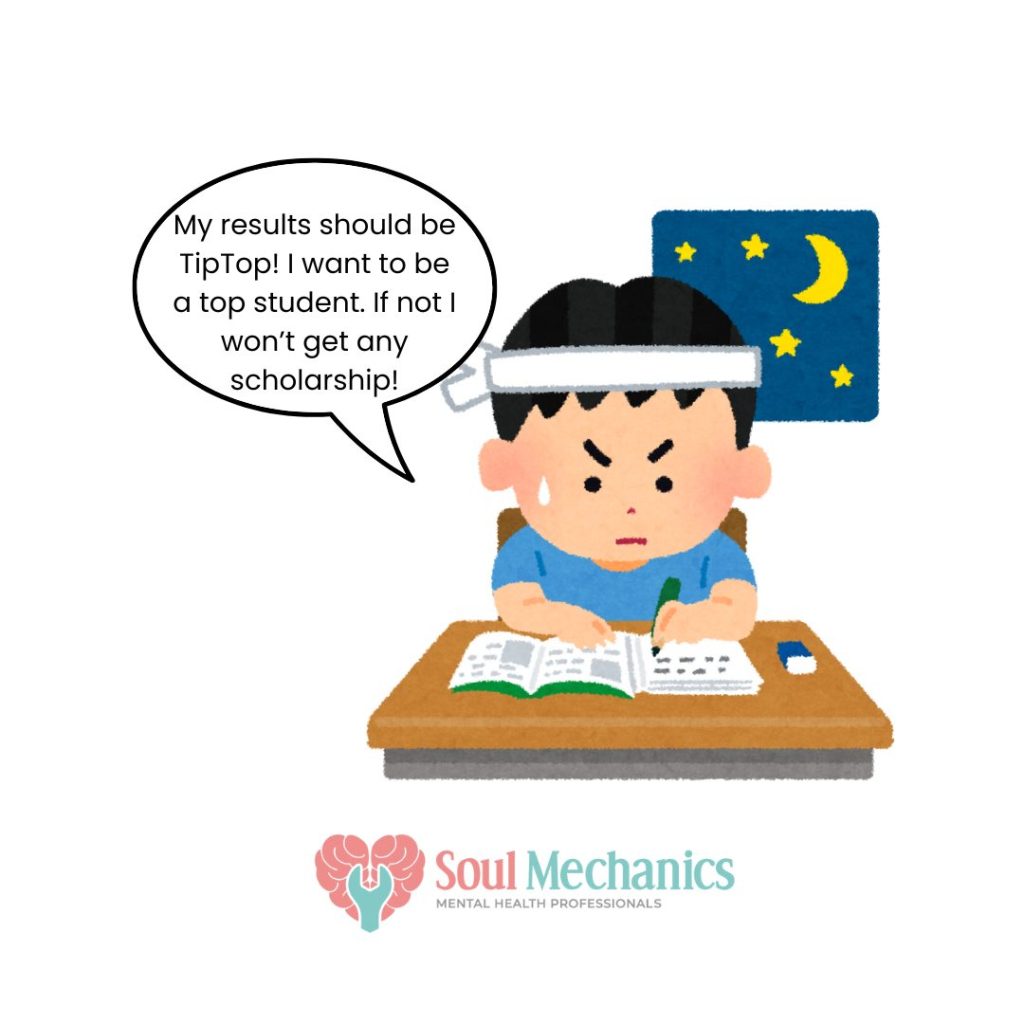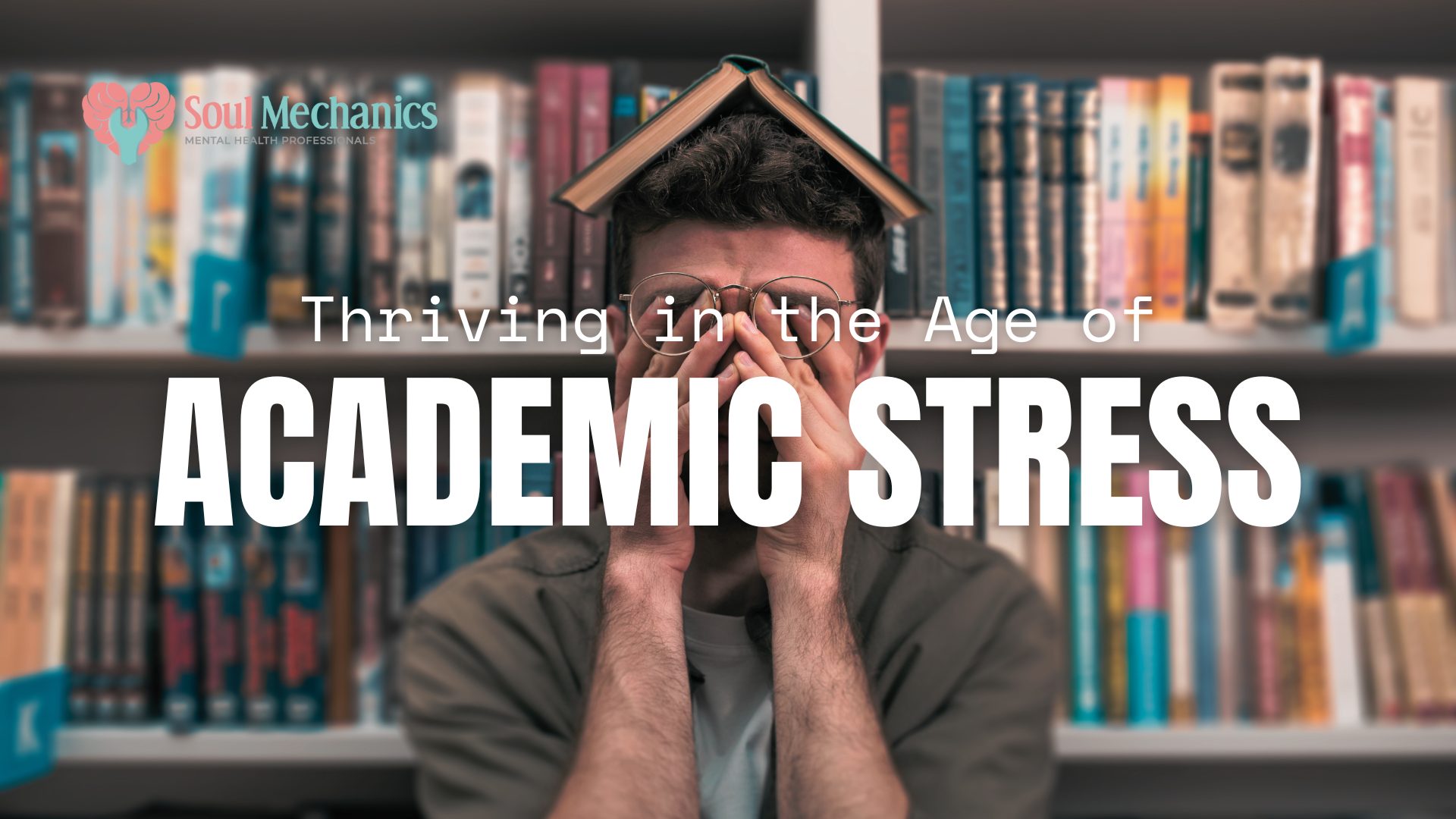Thriving in the Age of Academic Stress
Thriving in the Age of Academic Stress

Written by: Jenefa Anthony, Licensed Counselor (KB 11780)

Academic stress has spread like wildfire in today's fast-paced, results-driven society. Students of all ages are affected, becoming overburdened, anxious, and worn out. Although aiming for academic success is vital, too much stress can negatively impact relationships, mental and physical health, and general well-being. The good news? With the right approaches and perspectives, academic stress can be eased.
Academic stress is the emotional, mental, and physical pressure that students experience when they believe that their capacity to achieve their academic goals is not aligned with those goals. Exams and deadlines aren't the only causes; peer comparisons, failure-related anxiety, and parental or teachers' pressure are other contributing factors.
Key Contributors to Academic Stress:
- High Expectations: The pressure to perform well academically, obtain scholarships, or gain admission to esteemed universities breeds dread.
- Time Restraints: Burnout can result from balancing extracurricular activities, personal obligations, and schoolwork.
- Future Uncertainty: Anxiety is increased when there is uncertainty over one's academic or professional future.
- Perfectionism: A lot of students believe they have to be excellent at everything, leaving little space for mistakes or rest.

The Impact of Stress on Students’ Lives
Unmanaged academic stress can take many forms and impact many facets of a student's life:

- Cognitive Impairment: Long-term stress impairs memory, concentration, and decision-making, making it more difficult to learn or perform effectively.
- Emotional Strain: Students who feel caught in a vicious cycle of pressure and self-doubt frequently experience anxiety, despair, and irritability.
- Physical Symptoms: Stress can lead to a weakened immune system, gastrointestinal problems, headaches, and sleep disruptions.
- Behavioural Shifts: Some students may turn to maladaptive coping strategies like substance abuse, overeating, or social disengagement, or they may procrastinate or be avoidant.
Practical Strategies to Manage Academic Stress
Reframe Stress as a Challenge
Stress can indicate that something important is at risk, therefore, it's not necessarily a bad thing. Positive psychology research emphasises how effective it is to reframe stress as a challenge rather than a hazard. Students should be encouraged to prioritise effort, learning, and progress over results. Such perspective fosters resilience and lessens fear.
- Practical Tip: Consider saying, "This test is an opportunity to show what I've learnt," rather than, "I must ace this test."
Master Effective Time Management Skills
Ineffective time management makes academic stress worse. Educating pupils on how to set priorities, make plans or schedules, and follow them religiously helps greatly. It is especially beneficial to employ the Pomodoro Technique, which involves working in focused or intense periods interspersed with appropriate amounts of breaks.
Practical Tip: Make a list of your top three priorities first thing in the morning. Plan your study time, breaks, and leisure or rest with a suitable planner or app.

Establish Realistic Goals
Feelings of failure are frequently caused by unrealistic expectations. Assisting students in establishing attainable, measurable, and precise goals that suit their strengths is crucial. Moreover, splitting more complex tasks into smaller ones lessens the feeling of being overwhelmed.
- Practical Tip: Utilise the SMART framework, which stands for Specific, Measurable, Achievable, Relevant, and Time-bound. For instance, "I'll practise five maths problems and revise two chapters tonight."

Employ Relaxation & Mindfulness Techniques
An effective strategy to mitigate stress is mindfulness. Research indicates that mindfulness exercises, such as meditation or deep breathing, could boost attention and reduce cortisol levels. Relaxation exercises also benefit students by allowing them to reset during intense study periods.
Practical Tip: Train students in simple breathing techniques like inhaling for four counts, holding their breath for four counts, and exhaling for six counts. Meditation techniques can be guided by some useful mobile apps, too.
Promote Adaptive Coping Strategies
Students should learn proactive coping mechanisms as opposed to maladaptive behaviours or avoidance of stressful situations. Proven stress-relieving strategies include hobbies, social support, and physical activity.
Practical Tip: Motivate pupils to strike a balance between work and recreation. Mental health benefits can be greatly enhanced by vigorous exercise, a creative activity like painting, or a conversation with a friend.

Create a Network of Support System
Having a solid support system of family, friends, and mentors lessens the strain of academic stress. Open communication is essential; pupils should be free to talk about their difficulties without worrying about being judged.
- Practical Tip: Parents or educators could provide helping hands by prioritising effort over results. Rather than asking, "What stopped you from receiving an A?" Try stating, "I can tell you put a lot of effort into this. Let's talk about your areas for improvement.

Encourage Self-Compassion
Stress escalates as a result of students being their toughest critics. Treating yourself with kindness, acknowledging that mistakes, imperfections or failures are a necessary part of learning, and refraining from harsh self-judgment are all essential elements of practising self-compassion.
Practical Tip: Help pupils switch their negative self-talk, like "I'm so stupid for failing this test" with positive affirming ones like "I didn't do well, but I can learn from this experience."
How Can Parents and Educators Assist?
Parents and educators have a critical role in helping students manage their academic stress. They can help in the following ways:
- Refrain from drawing comparisons because each student has unique strengths and weaknesses. Celebrate personal growth instead of evaluating one against others.
- Encourage Open Communication: Establish a space where students can freely express their worries and anxieties.
- Set an example of healthy behaviour: Exhibit stress management strategies such as physical activity, a healthy lifestyle, and optimistic thinking.

- Offer Resources: Provide access to academic support, stress management programs, or counselling services.
When to Seek Professional Help?

Stress is inevitable, but when it interferes with day-to-day functioning, it becomes a concern. It is a sign to get professional assistance if a student exhibits recurring symptoms of anxiety, depression, or burnout, such as withdrawal, changes in eating habits, or deteriorating performance. A counsellor or psychologist can offer specialized interventions to deal with the specific issues they face.
Summary: Redefining Success Beyond Academic Grades
Many students endure academic stress, but it doesn't have to be debilitating. Students may transform stress into an opportunity for development and success if they are provided with appropriate resources, attitude, guidance and support. They may not only overcome academic obstacles but flourish in spite of them by cultivating resilience, engaging in self-compassion exercises, and asking for support when necessary.

If you’re looking for a therapist in Kota Damansara or Ipoh area, you can click here for more information.
If you enjoyed reading this, why not broaden the horizon of knowledge by learning about "Anxiety vs. Stress: How to Manage Both"? You can read the blog here.
For more content related to mental health, follow us on our official Instagram.

